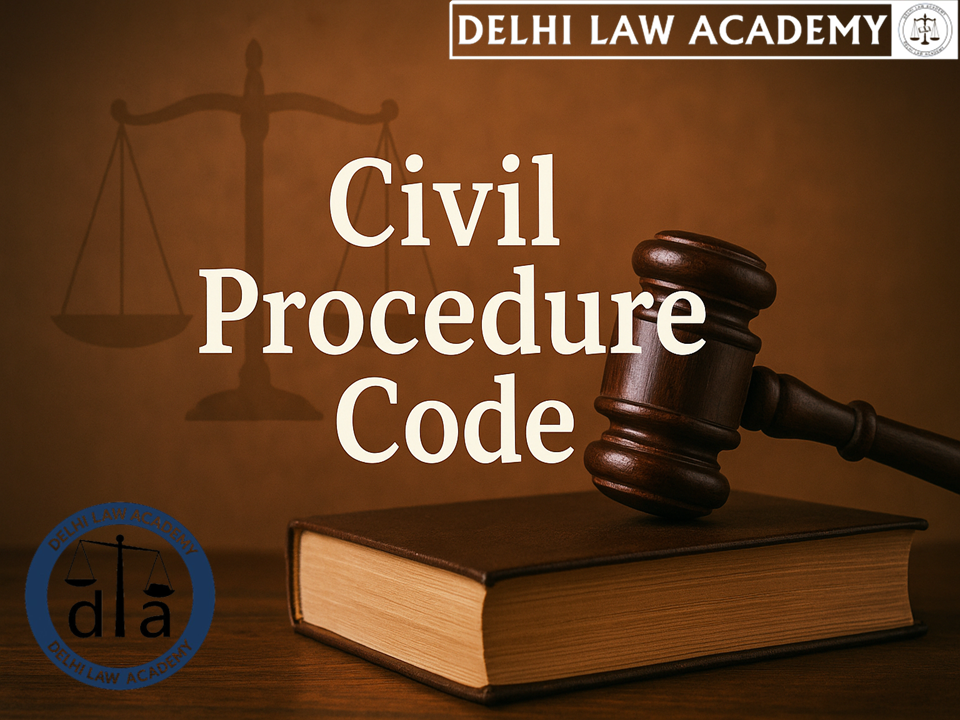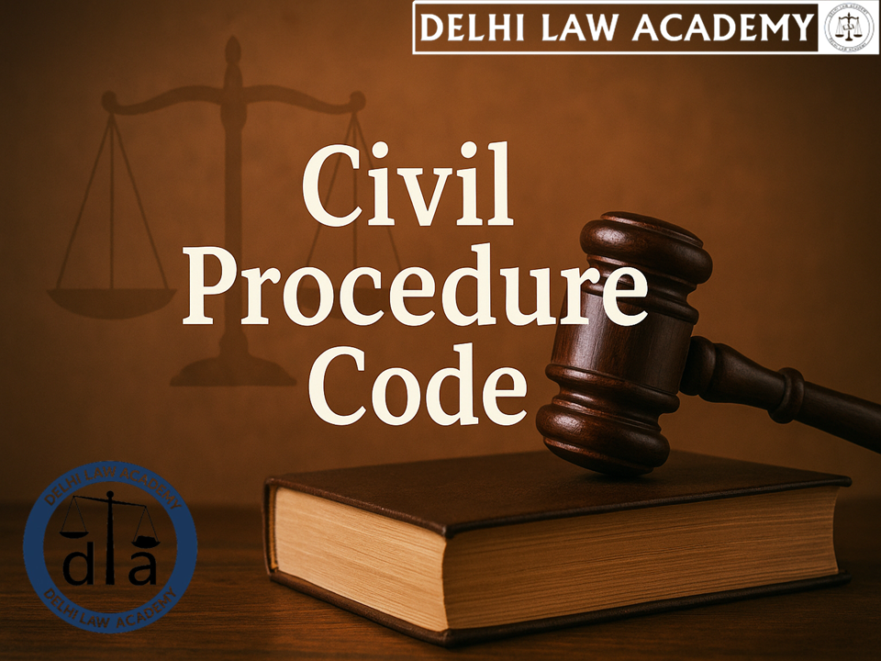
📘 CPC Test 2 [Fully Solved] | Civil Procedure Code MCQs
The Civil Procedure Code forms the bedrock of civil law. Its thorough knowledge is a must for all aspirants of RJS, DJS, PCS(J) or any other Judicial Service exam for that matter. To help such aspirants, Delhi Law Academy Jaipur has launched a series of fully solved tests on all important aspects of this vital part of their syllabus:
📝 CPC TEST 2 [FULLY SOLVED]
Q 16. Which of the following Orders and Rules of Civil Procedure Code deals with a decree for recovery of immovable property ?
(a) Order XX Rule 12
(b) Order XX Rule 11
(c) Order XX Rule 10
(d) Order XX Rule 9
Rule 9:
• Where the subject-matter of the suit is immovable property the decree shall contain a description of such property sufficient to identify the same
Ans: D ✅
Q 17. A decree of restitution of conjugal rights can be executed by
(a) attachment of the property of respondent
(b) arrest of the respondent
(c) attachment of property and arrest of respondent, both
(d) either attachment of property or by arrest of respondent and fine
Rule 32(1)
• Where the party against whom a decree has been passed for restitution of conjugal rights or the decree may be enforced by attachment of his property in case of decree for restitution of conjugal rights
Ans: A ✅
Q 18. Where after the end of hearing but before pronouncement of the judgement if any party to the suit dies, then the suit will
(a) abate
(b) not abate
(c) be decided ex parte
(d) None of the above
Rule 6
• There shall be no abatement by reason of death of either party between conclusion of hearing and pronouncing of judgment
Ans: B ✅
Q 19. A pleader has a duty to inform the court about the death of parties under-
(a) Order 22 Rule 1 C.P.C.
(b) Order 22 Rule 4 C.RC.
(c) Order 22 Rule 8 C.P.C.
(d) Order 22 Rule 10A C.P.C.
Order 22, Rule 10A
• Wherever a pleader appearing for a party to the suit comes to know of the death of that party he shall inform the Court about it…
Ans: D ✅
Q 20. An application for bringing on records the legal representatives of a party has to be filed within:
(a) 30 days of the death
(b) 75 days of the death
(c) 15 days of the death
(d) 90 days of the death
Rule 3(2)
• Where no application is made within the time limited by law suit shall abate so far as the deceased plaintiff is concerned
Rule 4(3)
• Where no application is made within the time limited by law: suit shall abate as against the deceased defendant
What is the ‘time limited by law’ referred in Rules 3(2) and 4(3)?
• The law referred is the Limitation Act 1963 and the time limited by that law is ninety days as seen from item 120 of Schedule to the Limitation Act
Ans: D ✅
Q 21. The death of a plaintiff or defendant shall not cause the suit to abate, if
(a) the cause of action survives
(b) the relief survives
(c) the right to sue survives
(d) all of the above
ORDER XXII Rule 1
• Death of a plaintiff or defendant shall not cause the suit to abate if the right to sue survives
Ans: C ✅
Q 22. Parties to the suit can compromise in a suit
(a) under order XXIII, Rule 3A of CPC
(b) under order XXIII, Rule 3 of CPC
(c) under order XXIII, Rule 1 of CPC
(d) under order XXIII, Rule 4 of CPC
Rule 3
• Where a suit has been adjusted by any lawful agreement or compromise in writing and signed by the parties Court shall order such agreement, compromise to be recorded and shall pass a decree in accordance therewith
Ans: B ✅
⚖️ CPC Test 3 – Fully Solved Questions (Civil Procedure Code)
MCQs with Solutions for Judicial Services Exams 🏛️
Q 23. The order noting compromise amongst the parties as passed under the provisions of Order XXIII Rule 3:
(a) Has to be in writing
(b) Has to be in writing and duly signed by the respective parties
(c) May not be in writing
(d) Has to be in writing but may not be signed.
Solution
Rule 3
• Where a suit has been adjusted by any lawful agreement or compromise in writing and signed by the parties Court shall order such agreement, compromise to be recorded and shall pass a decree in accordance therewith
Ans: B ✅
Q 24. Where a compromise was arrived between parties to a suit by playing fraud, misrepresentation or mistake and a decree was passed with the consent of the parties, then the suffering party may select which one of the following alternatives for setting aside such decree?
(a) Through Appeal
(b) Through Revision
(c) Through Review
(d) Through a second Suit
Solution
Explanation
• An agreement or compromise which is void or voidable under the Indian Contract Act shall not be deemed to be lawful
Rule 3A
• No suit shall lie to set aside a decree on the ground that the compromise on which the decree is based was not lawful
Order 43, Rule 1A
• In an appeal against a decree passed after recording a compromise it shall be open to the appellant to contest the decree on the ground that the compromise should not have been recorded
Ans: A ✅
Q 25. Which one of the following Orders of Civil Procedure Code is related to the issue of Commission?
(a) Order 24
(b) Order 26
(c) Order 25
(d) Order 27
Ans: B ✅
Q 26. Order XXVI, Rule 4A empowers the court to issue commission in a suit for examination of a person-
(a) resident within the local limits of its jurisdiction
(b) resident beyond the local limits of its jurisdiction
(c) who is about to leave the local limits of its jurisdiction
(d) Both (A) and (B)
Solution
Rule 4A
• Any court may issue commission for examination of any person resident within its jurisdiction in the interest of justice or for expeditious disposal or for any other reason
Ans: A ✅
Q 27. ‘A’ deposits a box of jewels with ‘B’ as his agent. ‘C’ alleges that the jewels were wrongfully obtained by ‘A’ from him and claims them from ‘B’. Here ‘B’
(a) can institute interpleader suit against ‘A’.
(b) can institute interpleader suit against ‘C’.
(c) can institute interpleader suit against ‘A’ and ‘C’ both.
(d) cannot institute interpleader suit against ‘A’ and ‘C’.
Solution
Illustration 1, Rule 5
Rule 5
• This Order shall not enable agents to sue their principals or tenants to sue their landlords for compelling them to interplead with any persons other than persons making claim through such principals or landlords
Ans: D ✅
Q 28. Rules relating to interpleader suit have been provided in the C.P.C, under which of the following orders?
(a) Order 50
(b) Order 35
(c) Order 55
(d) Order 40
Ans: B ✅
Q 29. Under which provisions of Civil Procedure Code temporary injunctions are granted?
(a) Under Section 116
(b) Under Section 152
(c) Under Order 39 Rule 1
(d) Under Order 29 Rule 1
Ans: C ✅
Q 30. Under Order XXXVIII, Rule 5 of the Civil Procedure Code, attachment before judgement can be in respect of
(a) immovable property
(b) movable property
(c) both (a) and (b)
(d) attachment cannot be made before judgement
Solution
Rule 5
• Where, at any stage of a suit, the Court is satisfied that the defendant
📚 Continue Your CPC Preparation
Don’t stop here! Strengthen your knowledge of the Civil Procedure Code with our other fully solved tests:
📘 Free Study Material for Judiciary Aspirants!
Download our FREE study material prepared by Delhi Law Academy’s expert faculty.
Contact us
📍 Delhi Law Academy – Jaipur Branch
6C, Tower 2, Coaching Hub, Pratap Nagar, Jaipur – 302033
📞 Phone:
+91 9911916552
+91 8447285606
✉️ Email:
contactus@delhilawacademy.com

